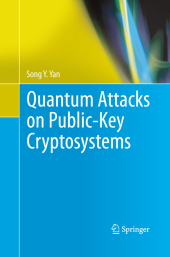 Neuerscheinungen 2015Stand: 2020-02-01 |
Schnellsuche
ISBN/Stichwort/Autor
|
Herderstraße 10
10625 Berlin
Tel.: 030 315 714 16
Fax 030 315 714 14
info@buchspektrum.de |

Song Y. Yan
Quantum Attacks on Public-Key Cryptosystems
2013. 2015. viii, 207 S. 5 Tabellen. 235 mm
Verlag/Jahr: SPRINGER, BERLIN; SPRINGER US; SPRINGER 2015
ISBN: 1-489-99779-2 (1489997792)
Neue ISBN: 978-1-489-99779-1 (9781489997791)
Preis und Lieferzeit: Bitte klicken
This book introduces basic concepts and ideas of quantum computing and quantum computational complexity. It discusses almost all known quantum attacks on IFP, DLP and ECDLP based public-key cryptosystems and covers many alternative post-quantum cryptosystems.
The cryptosystems based on the Integer Factorization Problem (IFP), the Discrete Logarithm Problem (DLP) and the Elliptic Curve Discrete Logarithm Problem (ECDLP) are essentially the only three types of practical public-key cryptosystems in use. The security of these cryptosystems relies heavily on these three infeasible problems, as no polynomial-time algorithms exist for them so far. However, polynomial-time quantum algorithms for IFP, DLP and ECDLP do exist, provided that a practical quantum computer exists.
Quantum Attacks on Public-Key Cryptosystems presemts almost all known quantum computing based attacks on public-key cryptosystems, with an emphasis on quantum algorithms for IFP, DLP, and ECDLP. It also discusses some quantum resistant cryptosystems to replace the IFP, DLP and ECDLP based cryptosystems.
This book is intended to be used either as a graduate text in computing, communications and mathematics, or as a basic reference in the field.
Classic and Quantum Computation.- Quantum Attacks on IFP-Based Cryptosystems.- Quantum Attacks on DLP-Based Cryptosystems.- Quantum Attacks on ECDLP-Based Cryptosystems.- Quantum-Computing Resistant Cryptosystems.
From the reviews:
"The book offers a detailed overview of the main intractable problems which ensure security of usual cryptosystems ... and the way to solve them using quantum calculus. ... It can be very well used as a course for undergraduate students, many notions being self-contained ... . book is very interesting, easily to be followed, pedagogically constructed. It offers a good source of information, being an excellent support for students and researchers who wish to find general details about the new paradigm of computation ... ." (Adrian Atanasiu, zbMATH, Vol. 1273, 2013)


